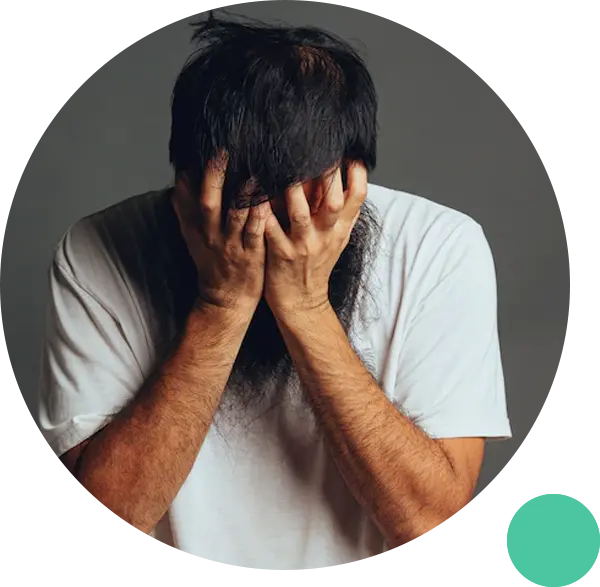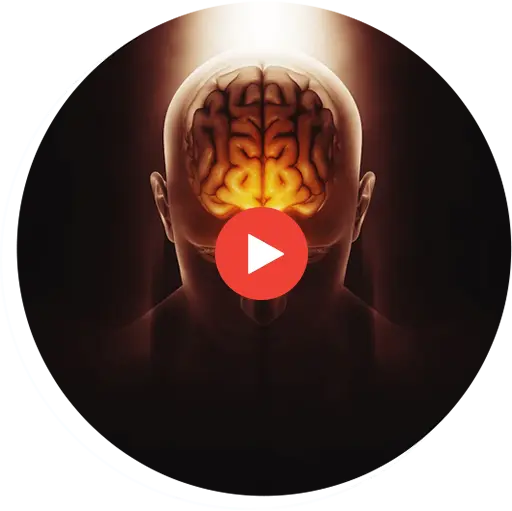-mob.webp)
Consult an Online Doctor
For Depression/Anxiety
Book an Appointment for
Only 
Different types of anxiety disorders are known to include social anxiety disorder, generalized anxiety disorder, and specific phobias. Sometimes, anxiety can be triggered by a medical condition. However, consulting an online doctor for anxiety and depression can help you manage the condition.
TELMDCARE
What are
Anxiety Disorders?
An anxiety disorder is a mental condition where you may feel fear in certain events or
circumstances. In addition, you could suffer the physical symptoms of anxiety, like heavy
perspiration, increased heart rate, and high blood pressure.
Let's discuss the types, causes, systems and treatments, and medications of Anxiety
Disorders.
Although anxiety is a normal part of life, people with anxiety disorders often experience
intense worry and fear about various situations. These disorders often trigger repeated
episodes
of fear and panic attacks.
These feelings can interfere with daily activities and can last for a long time. People with
anxiety disorders may start developing symptoms as early as childhood or adolescence. They
can
also avoid certain situations to prevent their feelings from returning.
TELMDCARE
Is covered by many popular
insurance plans

Who Is At Risk For Anxiety Disorders?
Environmental and genetic factors can increase the risk of anxiety disorders. Some of these include behavioral inhibition and shyness.
How Do Anxiety Disorders Affect Children?
It’s normal for kids to feel scared, anxious, or worried at certain times.
TELMDCARE
Types Of Anxiety Disorders
There are four main types of anxiety disorders, including:
Panic Disorder
Panic disorder induces abrupt and intense panic attacks in anxiety sufferers. This disorder has more intense effects than the other types of anxiety disorders.
What Happens During a Panic Attack?
Patients might feel the following things during a panic attack:
Phobias
Phobias are intense fears based on specific things or events. Some of these fears are rational, while some might be irrational. However, the fear triggers a quiet and intense response in both cases.
Agoraphobia
Agoraphobia is an intense fear that induces a feeling of helplessness. These patients normally prefer working with a depression virtual doctor and get consultations online since their condition prevents them from visiting a doctor in person. Usually, agoraphobia manifests itself as fear in either of the following environments:
TELMDCARE
Separation Anxiety Disorder
This condition is commonly seen in children, and in some cases, teens. People that suffer from separation anxiety feel restless or uneasy when separated from their parents. These children may suffer from fear of their parents abandoning them or hurting them some other way. Separation anxiety disorder occurs mostly in preschoolers. However, teens and adults going through stress can experience it as well.
Causes of Anxiety Disorders

TELMDCARE
As Seen On


TELMDCARE
Symptoms Of
Anxiety Disorders
Depending on the type, symptoms can vary for anxiety disorders, including physical, mental, and behavioral. Typical symptoms include:
Physical
Mental
Behavioral:
TELMDCARE
Treatment for Anxiety Disorders
An anxiety disorder requires constant and comprehensive treatment like most mental health
conditions. Its needs therapy and medication to improve the patient's symptoms. In recent
decades, significant progress has been made in the treatment and medication to help those
who
suffer from such conditions as depression and Obsessive-compulsive disorder (OCD).
Your treatment for depression and anxiety may even include a combination of exercises,
psychotherapy, and medication, to achieve the best results.

TELMEDCARE
What we treat
We treat a variety of acute and chronic conditions and provide expert medical advice and guidance for our patients.
Read More
Medications For
Anxiety Disorders
Medications can only improve anxiety symptoms and not cure them. The prescribed medication can help you manage your symptoms to improve your quality of life and improve mental health. These medications include:
- Anti-anxiety medications like benzodiazepines may reduce the feeling of anxiety, fear, worry, and panic. They work almost immediately, but your body may build a tolerance to it over time.
- Antidepressants—help with anxiety disorders. They manage your neurochemicals to decrease your stress levels and maintain your mood. Antidepressants are also used as Anti-anxiety medications. In fact, you can use Anti-anxiety medications after tapering off of Antidepressants for a more efficient treatment plan.
- Beta-blockers— help with physical symptoms like elevated heart rate, shivering, and shaking.
You can make an appointment online to visit a doctor to consult in treatment and management of your anxiety disorders or depression. At TelMDCare, our telemedicine doctors for depression can help develop a treatment plan and prescribe anxiety disorders and depression medications.
TELMDCARE
Sign Up
Our best online doctors on call ensure that the services we provide are adequate, high
quality,
and affordable.
Get in touch with us today for more details or Sign Up for a quick consultation.
$43 SIGN UP
TELMDCARE
FAQs about Anxiety and Depression
People with depression often experience anxiety, excessive worry and even panic attacks. These conditions are often co-occurring.
People with anxiety often feel uneasy, worried, or terrified due to their circumstances or due to the anticipation of a future event.
In clinical depression, a person's behavior, thinking, and feelings are severely affected. Unlike normal sadness, this condition is persistent and can interfere with a person's ability to anticipate or experience pleasure. It can also lead to other health risks. The symptoms of this condition can last for several weeks or even years. If left untreated, it can cause significant impairment and worsen the patient's health.
A person experiencing major depression is considered to have this condition if they experience at least five of the symptoms in a row for two weeks. One of these must be either loss of pleasure or interest. Most of the day, the person experiences a depressed mood. They frequently lose interest in activities and are prone to experiencing feelings of hopelessness and helplessness. In addition, they may experience fatigue and a loss of energy. They may also feel guilty or feel worthless. They may think about suicide attempts or death.
Getting a medical evaluation is the first step in diagnosing depression. A doctor can determine if a medical condition is contributing to the patient's condition by performing various tests and conducting a physical examination. If a medical condition is ruled out, the patient can then be referred to a mental health professional. Individuals diagnosed with depression can be treated with various methods. Some of the most common treatment methods include medication and psychotherapy.
Compared to men, women are more prone to experiencing depression. About 20% of women will experience a depressive episode in their lifetime. Scientists are currently trying to determine why women are more prone to experiencing this condition. Various factors such as biological, psychosocial, and hormonal factors are known to play a role in the development of this condition. Before adolescence, both boys and girls experience depression at the same rate. However, by then, the latter is more likely to develop this condition than the former. Some of the possible reasons why this occurs is due to the hormonal and biological changes that occur during puberty. Studies also suggest that women are more prone to experiencing depression when they experience difficult situations. They reportedly are more likely to continue feeling guilty or sad even after going through something difficult.
Being a new mother can make it hard for women to cope with the changes that occur after giving birth. Some new mothers experience a brief period of depression called the "baby blues." These symptoms usually go away within the following few days. However, experiencing postpartum depression can last for several months following the birth of a child. This condition is considered to be a serious illness that requires continuous emotional and physical support. According to some studies, women who experience this condition have previously experienced depressive episodes.
The concept of menopause refers to the period of absence of menstrual periods for 12 months. During this time, the production of certain hormones decreases permanently. This condition can make it hard for a woman to get pregnant. It can also increase their risk of experiencing depression. Scientists are currently trying to determine how the various changes that occur during this period can affect the brain chemistry of individuals with depression.
Some of the factors that can affect the development of depression later in life are the changes in the body and brain. For instance, older adults may experience a condition known as ischemia, which can restrict the flow of blood. Over time, the blood vessels may become less flexible, and this may prevent the blood from going to the brain and other organs. If this condition is diagnosed in older adults without a family history of depression, then they may develop vascular depression. This condition can also lead to cardiovascular issues, such as heart disease or stroke.



